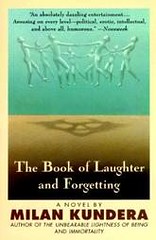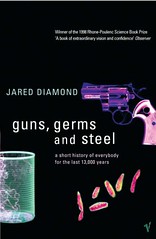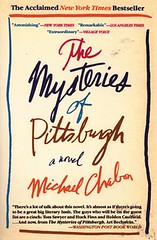Friday, February 10, 2006
Kundera, Diamond, and Chabon
I haven't read as much this past couple of months. First there were the holidays, and then there was my television in the room finally getting fixed (why read when you can watch girls jumping on trampolines at 3 in the morning), and now, for the last two weeks, work's been quite hectic. Over this span, I was able to read three books. Milan Kundera's Book of Laughter and Forgetting was brilliant. I liked it much better that I did The Unbearable Lightness of Being; it was more poignant, easier to digest, and in a way, funnier. Kundera talking of the frailty of human memory and of laughter beyond joking affected me much more than Being ever did.
Over this span, I was able to read three books. Milan Kundera's Book of Laughter and Forgetting was brilliant. I liked it much better that I did The Unbearable Lightness of Being; it was more poignant, easier to digest, and in a way, funnier. Kundera talking of the frailty of human memory and of laughter beyond joking affected me much more than Being ever did.What stuck with me most was his description of the divine origins of laughter. The devil originally expressed laughter in the face of God's work, about the whole pointlessness of it all. It was a contagious laughter, and the angel, not knowing what to do, decided to start laughter on his own to glorify God and His work.
Whereas the devil's laughter denoted the absurdity of things, the angel on the contrary meant to rejoice over how well ordered, wisely conceived, good, and meaningful everything here below was.
Thus the angel and the devil faced each other and, mouths wide open, emitted nearly the same sounds, but each one's noise expressed the absolute opposite of the other's."
 Guns, Germs and Steel was a very interesting book, and I could see why it won the Pulitzer Prize. I even buy the theses he presents in the book, that man's story has been affected mostly by geographic circumstances.
Guns, Germs and Steel was a very interesting book, and I could see why it won the Pulitzer Prize. I even buy the theses he presents in the book, that man's story has been affected mostly by geographic circumstances.Oddly enough, for a 500-page, there was little new information I read in the book that I didn't already know from watching National Geographic or from playing Sid Meier's Civilization. I also had some qualms about Diamond's tendency for holding the reader's hand, constantly re-explaining concepts he had discussed previously in the book. But then again, I guess it helped make the book more accessible for readers who didn't necessarily watch National Geographic or play Civ.
 The last book I read was Michael Chabon's first novel, The Mysteries of Pittsburgh. I'd already read three of his books and I count him as one of my favorite authors, and this one certainly did not disappoint. It was awkward, flawed, deeply emotional, and brilliant, just as I suspect the author himself was at the time he wrote it.
The last book I read was Michael Chabon's first novel, The Mysteries of Pittsburgh. I'd already read three of his books and I count him as one of my favorite authors, and this one certainly did not disappoint. It was awkward, flawed, deeply emotional, and brilliant, just as I suspect the author himself was at the time he wrote it.In a piece for the New York Review of Books discussing the writing process for his first novel, Chabon talked about how he had been influenced by The Great Gatby by F. Scott Fitzgerald (an author to whom he had been compared quite favorably).
The Great Gatsby did what every necessary piece of fiction does as you pass through that fruitful phase of your writing life: made me want to do something just like it.
Chabon ended up writing something that should inspire people to want to do something like it. For a moment, I even thought of my old dreams about telling stories and writing books. Whatever the hell happened to that? I think it went away as soon as I turned on the television and saw girls jumping on trampolines.
Here's a list of what's on tap, books I own but haven't yet read:
A Pale View of the Hills - Kazuo Ishiguro
Echo - Francesca Lia Block
Norwegian Wood - Haruki Murakami
The Name of the Rose - Umberto Eco
Waiting for the Barbarians - J.M. Coetzee
The Natural - Bernard Malamud
The Horse Whisperer - Nicholas Evans
Perdido Street Station - China Mieville
Amsterdam - Ian McEwan
The Life of an Amorous Man - Saikaku Ihara
Moneyball - Michael Lewis
The Once and Future King - T.H. White
Beloved - Toni Morrison
A Nietzsche Reader
McSweeney's Quarterly No.9
Comments:




